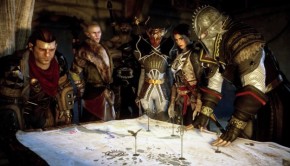Rusty’s Real Deal Baseball: With Friends Like These
Gamers love arguing on the Internet about microtransactions and DLC. The practice of charging for additional content, in-game currency, or small chunks of gameplay has caused disagreements since companies first starting putting prices on digital goods. Disputes mainly revolve around what makes a particular piece of DLC reasonable or unreasonable. and whether DLC is a worse option for players than simply buying the content outright. But even DLC’s biggest advocates typically see it as necessary, nothing more. It’s a delivery system that reflects the reality of a changing industry. Hardly anyone argues that we should enjoy DLC.
 Nintendo, however, loves to defy expectations. When they decided to test out the microtransaction model, they created a game which relies on DLC to generate not only revenue, but also narrative tension and gameplay scenarios. Rusty’s Real Deal Baseball needs microtransactions to work as a game; if Nintendo let you buy the game all at once, it would actually be to its detriment. By forcing the player to haggle over real-life microtransactions, the player enters into a hilariously destructive relationship with the game’s depressed star: Rusty.
Nintendo, however, loves to defy expectations. When they decided to test out the microtransaction model, they created a game which relies on DLC to generate not only revenue, but also narrative tension and gameplay scenarios. Rusty’s Real Deal Baseball needs microtransactions to work as a game; if Nintendo let you buy the game all at once, it would actually be to its detriment. By forcing the player to haggle over real-life microtransactions, the player enters into a hilariously destructive relationship with the game’s depressed star: Rusty.
Rusty Slugger’s life is in shambles. His children don’t respect him, his wife has disappeared, and his business can’t get out of the red. At the start of the game, Rusty has spent his entire life savings stocking his store with games no one wants, for a system no one owns, all based on a sport no one plays anymore. When you, the player, shows a modicum of interest in his games, Rusty gets so excited that he gives you a system for free (well, as long as you babysit one of his many kids).
The game puts a lot of effort into ingratiating Rusty to the player. By the time you get to the first haggling session, you feel really bad for the guy. You want to help him out. However, the haggling mechanic, where the player convinces Rusty to bring down the real-world prices of the mini games, prevents you from truly sympathizing with him. You conspire with his kid to mess with his head. You mock and deride his business practices. When you lower the price as far as it will go, Rusty complains that he won’t make any profit from the sale. And when later prices go even lower, he’s likely losing money on each game sold. Even in the midst of disaster, when Rusty needs nothing more than some cold, hard cash, the player shows up and demands another discount. By the end of the game, Rusty’s haggling habit has put his already-floundering business in serious jeopardy.
 Had Rusty’s Real Deal Baseball cost a flat $15 for the whole game and used in-game currency for haggling, this compelling push and pull between the player and the game would lose its meaning. Technically, the player can choose to forgo haggling and pay full price for every mini-game. Doing so would probably make Rusty’s day! And if the game used imaginary currency, some charitable players might just grind out the necessary dough. But no rational player is going to pay four real dollars when a 50-75% discount is just a few conversations away. Real money means real engagement, as the player does everything possible to trick Rusty into increasing his discount. Even when the player gives Rusty helpful advice or inspiring items, your motivation is in question. Do you really want to help this dog? Or do you just want to save a buck or two? It’s entirely possible you’re just another variable in Rusty’s crumbling life.
Had Rusty’s Real Deal Baseball cost a flat $15 for the whole game and used in-game currency for haggling, this compelling push and pull between the player and the game would lose its meaning. Technically, the player can choose to forgo haggling and pay full price for every mini-game. Doing so would probably make Rusty’s day! And if the game used imaginary currency, some charitable players might just grind out the necessary dough. But no rational player is going to pay four real dollars when a 50-75% discount is just a few conversations away. Real money means real engagement, as the player does everything possible to trick Rusty into increasing his discount. Even when the player gives Rusty helpful advice or inspiring items, your motivation is in question. Do you really want to help this dog? Or do you just want to save a buck or two? It’s entirely possible you’re just another variable in Rusty’s crumbling life.
Of course, as a Nintendo game, Rusty’s Real Deal tries its best to stay cheery. By the end, Rusty’s in a better place, and his family thanks you for all you’ve done. However, the game never establishes exactly what you’ve done, besides babysit his pups from time-to-time. Rusty enjoys haggling, but haggling destroys his profits. You encourage him to better himself, but none of your advice has any real effect on his life. Objectively, you benefit from your interactions far more than he does. You are Rusty’s only friend, a manipulative jerk who will say or do anything to swindle him out of a buck. The game tries its hardest to make you care about Rusty, but you don’t, not actually. After the final haggling session, you feel victorious not because Rusty’s gotten his life back together, but because his good mood nets you one heck of a discount.
This warped relationship turns Rusty’s Real Deal into Nintendo’s most cynical title since the Pikmin series. Like that series, the game tries its best to wrap everything up with a wink and a laugh, but there’s a darker undercurrent at play. Rusty’s Real Deal establishes this unease through its gameplay, and that gameplay needs real money transactions to have any consequence. Otherwise, the game would devolve into a weightless visual novel. Rusty’s Real Deal Baseball is a game about our relationship with DLC, making its DLC both reasonable and necessary. Nintendo may be nickel-and-diming you, but it’s always on your terms.
Oh, the baseball mini games are fun, too.
2 Responses to Rusty’s Real Deal Baseball: With Friends Like These
Leave a Reply
You must be logged in to post a comment.











The game can be fun and I like haggling to get a discount but there is too much to buy.
Seems like there’s more subtext going on here than any Nintendo game I can remember. No one wants to see Rusty fail, but our compulsion to get things cheap overpowers our compassion. His business is fun and games but the reduction in his profits are genuine.